Around the Bloc: Controversial Russian Anti-Terrorism Law Hits First Target
Krishna follower faces sanctions for speaking to passers-by and handing out religious books.
More...We kindly inform you that, as long as the subject affiliation of our 300.000+ articles is in progress, you might get unsufficient or no results on your third level or second level search. In this case, please broaden your search criteria.
Krishna follower faces sanctions for speaking to passers-by and handing out religious books.
More...
The article defines the basic postulates of the ethical concept of civil law and shows their methodological importance for disclosure of the fundamental properties of law and the patterns of its functioning. A conclusion is made regarding the dialectic nature of the transition from moral consciousness to the legal one.
More...
The relevance of the study is determined by the fact that the role of discretionary principles has been enhanced in connection with the development of market relations in the sphere of higher education, which manifests itself in the possibility of teachers to enter into civil law contracts with the educational institution in which they work, as well as with other organizations and entities. The study was performed to determine the specificity of the private legal status of teachers of higher school and to identify their major civil rights and obligations. The objectives of the study are the following: – to examine the legal status of teachers in general; – to identify elements of the legal status of teachers in higher education; – to reveal the contents of the private legal status of higher school teachers; – to compare the private legal status of higher school teachers with their labor status. The leading method of research used by us is the method of analysis of the normative-legal acts and literature devoted to the issues of civil-legal regulation of higher education. The paper points out that university teachers do not have any civil relations with students and are not counterparties to the contract on rendering of paid educational services. The counterparty under this contract is the educational organization of higher education. Civil law relations emerge and develop between the university and students, while the university and teachers have labor relations. Higher school teachers enter into civil law relations at conclusion of civil contracts related to the results of creative activity, agreements on the implementation of individual works and the provision of certain services. Based on the obtained results, it was concluded that higher school teachers, acting as the counterparties to the relevant civil law contracts, gain individual rights and responsibilities, have the burden of private law liability imposed on them, which, ultimately, forms their private legal status. The latter should not be confused with the labor status of university teachers. These findings are important for the law enforcement practice.
More...
The Housing Code of the Russian Federation stipulates ways of protection, which are different from those in the Civil Code of the Russian Federation, thereby requiring careful analysis of the characteristics of methods used to protect the housing rights. The paper assesses the claims for recognition in the judicial practice on housing cases. The recognition objects of housing claims are various legal phenomena designated by such polysemantic term as “right”: subjective rights, entitlement of subjective rights, secondary rights. The problem concerning definition of the recognition objects is solved. In particular, the correlation between claims for recognition of ownership of the place of residence and for recognition of the right to use the place of residence is considered. The conclusion is made about the necessity of refusal of claims for recognition of the right of use, because it is the only subjective element of the housing rights. Similar conclusions are formulated regarding the right to moving into the place of residence and the right to privatization, which are the elements of legal powers to use the place of residence and do not require separate recognition. The current practice of forcing citizens to appeal to the court for recognition of the right of a member of the owner’s family is criticized, since the judicial recognition of this right is not stipulated in the housing legislation. In the light of the civil legislation reform, the question is raised about the relationship between the claims for recognition of the housing rights and the claims for recognition of the rights of obligation. It is concluded that the features of the proprietary rights determine the features of the claims for recognition of the proprietary rights, but not the fact that this method of protection (after changes to the Russian Civil Code) would apply solely to corporeal rights.
More...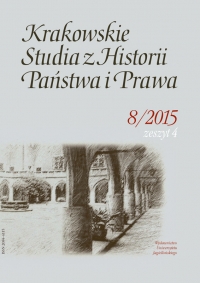
The article reviews theoretical bases of the social doctrine as well as the legitimacy of the state interference in resolving social inequalities among the population, with respect to the dynamics of the economic, political and social changes, and other factors. Subsequently, the paper maps, throughout a brief historical excursion, the development in the 19th century, when after the disappearance of feudal relations, the obsolete labor and social legislation regulating the position of an individual as well as the social classes, was changed. Social conflicts of a new quality began to emerge on the grounds of the development of the manufacturing sector. It was necessary to approach these conflicts with new instruments to be applied at economic, legal and social levels, respectively. Primarily, however, the article reflects the development after the formation of the First Czechoslovak Republic and the origins of the social legislation in the said period. Tomáš Garrigue Masaryk was the authority who outlined contours of the social doctrine in the First Czechoslovak Republic. The article further considers national and international sources as well as pertinent social legislation.
More...
Experts usually agree that security (meant as safety) is a complex concept and that it refers, in general, to freedom from any threats to the fundamental values. Hence, the author presents in her paper the views on security. But since security as a natural and inalienable right is given particular prominence in the catalogue of rights protected by international law, the paper also addresses the instruments of international law that regulate these issues. The most important Polish legal instrument regulating security issues is the Constitution of the Republic of Poland adopted in 1997. It should be noted that the concept of national security has not been adequately explained in the Polish Constitution and generally, this term does not appear in the text separately. In this respect, Article 5 of the Constitution is of importance: “The Republic of Poland shall safeguard the independence and integrity of its territory and ensure the freedoms and rights of persons and citizens, the security of the citizens, safeguard the national heritage and shall ensure the protection of the natural environment pursuant to the principles of sustainable development”. Security regulations can also be found in other articles of the Constitution. The author emphasizes that, due to the broad scope of security issues and to the abundance of bodies and their subordinate units and offices that carry out tasks regarding this scope, there is a necessity to harmonize their activities. The constitutional regulations can be helpful in this respect. The Constitution clearly states that higher responsibility in this respect rests with the Council of Ministers. The role of the President is limited to supporting the government. This is clearly visible in the regulations concerning jurisdiction.
More...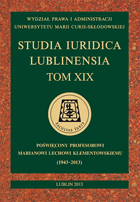
In 1949 Polish and Czechoslovak lawyers prepared a draft of joint family law for both states. It was prepared for political reasons, to implement communist law in two “people’s democracy” countries. It was based on Soviet law. The Czechoslovak part was quicker in passing the new law. The final debate took place in National Assembly on December 7th, 1949. Only three persons took part in it. It had completely ideological character. Especially the Minister of Justice had very communist speech. He criticized strongly “capitalist” family law and attacked the Catholic Church, because Czechoslovak bishops were protesting against civil marriages. In fact the draft on family law was used by the communist authorities to create anti-church atmosphere. The bill was passed without votes against. Similar debate took place in Polish Sejm in 1950, although it had a little bit less ideological character.
More...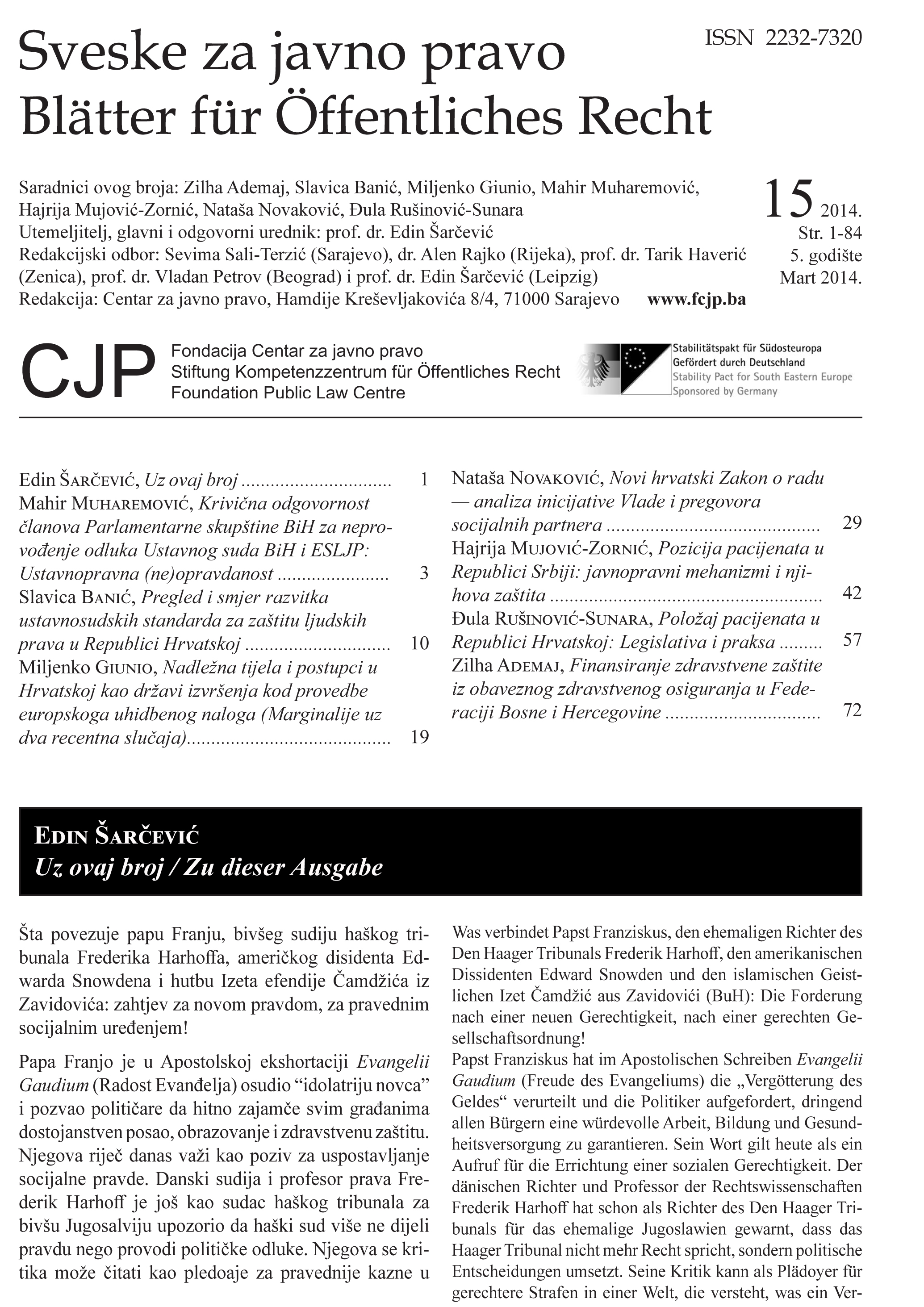
Izvršavanje odluka sudova je od ključnog značaja za svaki pravni sistem. Odluka suda koja se ne izvrši, neće proizvesti željeni efekat, ukoliko subjekti na koje se ona odnosi ne postupe po njoj. Dakle, pravda koja se izriče u neprovedenim odlukama sudova je nedorečena i nezadovoljena pravda. Zbog toga svaka država nastoji maksimizirati efikasnost provođenja odluka svojih sudova, pri čemu razvija određene mehanizme koji će osigurati implementaciju sudskih odluka.
More...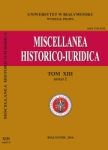
The article presents the problem of conformity of civil partnership, i.e. the legally recognized relation of two adults other than marriage, with the selected rules of the Polish Constitution of 1997. The initial analysis concerns the conformity with Article 1 (the Republic of Poland as the common good of all its citizens), Article 2 (the principle of a democratic state ruled by law), Article 25 Section 2 (the principle of impartiality of the public authorities) and Article 32 (the principle of equality before the law and prohibition of discrimination). A particularly important problem is the conformity of civil partnership legalization with Article 18, enforcing the state to protect marriage, family and parenthood. The conformity of civil partnership with Article 31 Section 3, dealing with the possible limitations of constitutional freedoms and rights of the citizens is also discussed. In the final part of the article, the author presents assumptions concerning the possible legal regulations of civil partnership. In his opinion, there are no constitutional or legal obstacles to creating legally recognized civil partnerships in Poland, although the partners should have such rights which are presently available to couples living in informal unions, according to the rules of civil law.
More...
Development of the Croatian legal system based on the Austrian General Civil Code (GCC) in the period 1853–1946 made the GCC a watershed of legal tradition. Founded on liberal principles, and the principle of individuality, it had a significant impact on the society at the time of its introduction – it had brought the feudal social and legal system to an end, and facilitated the emergence of a modern civil society. However, the process of transformation was marked by numerous problems for which the reasons were found in the GCC, particularly in its provisions on intestate succession. Introduction of the principle of equality of male and female descendants in the matters pertaining to inheritance was considered particularly controversial, especially concerning its application in the matters of land inheritance. Difficulties in the application of the principle of equality of inheritance were justified by the legal consciousness in some parts of Croatian society, which were opposed to the idea of gender equality in succession. Also, a belief prevailed that (further) partition of predominantly small lots of land into even smaller parts, following the disposal of the estate between male and female descendants, would lead to difficult economic circumstances and poverty.
More...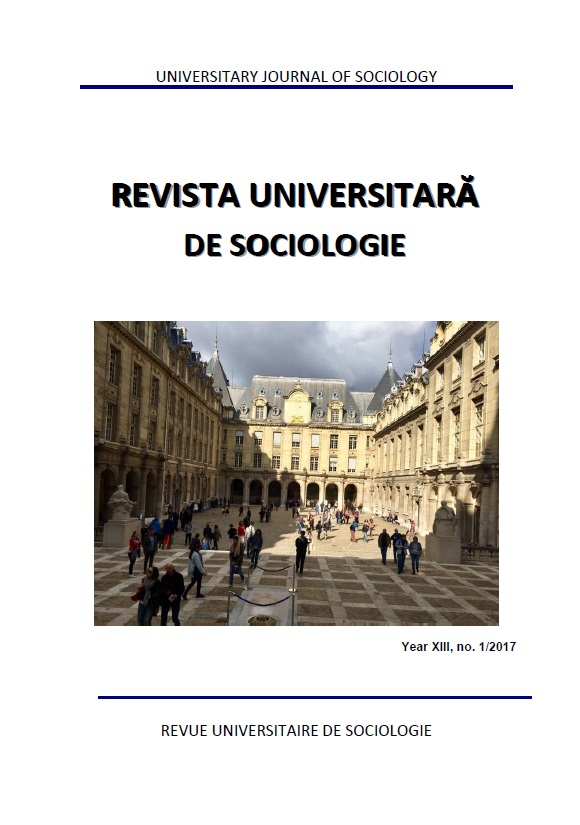
The phenomenon of sexual abuse committed on the minors has recently met an unpreceded spreading in Romania, mass media presenting these situations frequently. Unfortunately, within the modern society, there are more and more numerous the cases in which the victims of rape are underage, some of them of young ages, the sexual assault committed on them becoming special social problems. While the statistics has continued to maintain a gradually ascendant trend, year by year, the authorities seem available, at least at this moment, to diminish considerably the phenomenon of the sexual abuses committed on minors, among which not only the rape is noticeable, but also the incest.
More...
Roman law has a clear place in the legal system of countries in Europe. The legal system of the Republic of Macedonia belongs to the Romano-German group. The study of Roman law in law faculties is based on a num-ber of reasons - scientific, educational, didactic and cultural. It has been taught at the Faculty of Law in Skopje since its establishment as a historical-legal discipline. The article discusses the prospects for development of the roman law in contemporary legal education.
More...
The figure of Augustus is intimately related to the history of Gallaecia, because it was one of the last territories subject to the rule of the Roman Empire. It is true that Gallaecia did not constitute an administrative division in itself at the time of the Emperor, apart from what the controversial Bierzo Edict might suggest, but this approach was adopted in other to give Gallaecia the place it deserves in Roman history. There is not much information on the military activities carried out in Hispania, probably due to the strong interest in the clashes between the successors of Caesar at the time. The silence of the sources does not help to better understand the evolution of the provincial institutions located in Gallecia. Significantly more information is available from 26 A.D. when Augustus personally took the lead of the war in Hispania, now reduced to the territory of the Cantabrians, Astures, and Galicia, which shows the importance attributed by the new sovereign to the definitive conquest of the entire Hispanic territory.
More...
Krajem marta izborne 2018. godine, u gradu na Vrbasu, pronađeno je tijelo dvadesetjednogodišnjeg mladića u kanalizacionom tunelu. Press-konferencija policije nas uvodi u slučaj. Mladićevo kretanje predstavljeno detaljno do momenta kad mu se gubi svaki trag. Policijski moza(i)k skraćenom procedurom posthumno oblikuje mladićev karakter u ono što svakog od nas može da zadesi zadesnom smrću – narkoman i sitni kriminalac. Potukao se u Meti, pojeo burek, obio kuću, te drogiran i pijan završio u poslovičnoj Crkvenoj. Patolog u obdukcionom nalazu tvrdi da je smrt nastupila u večeri nestanka. Druga obdukcija smrt pomjera za nekoliko dana. Prvi patolog nepostojećim aparatima u tijelu pronalazi tragove LSD-a, THC-a i alkohola. Ne nalazi tragove nasilne smrti i zaključuje zades. Istovremeno ekipa sa klupe u tužilaštvu protiv zadesno stradalog diže optužnicu za incident iz prethodne godine, pa je povlači. Svakom se omakne greška. Ili desetak greškica. [...]
More...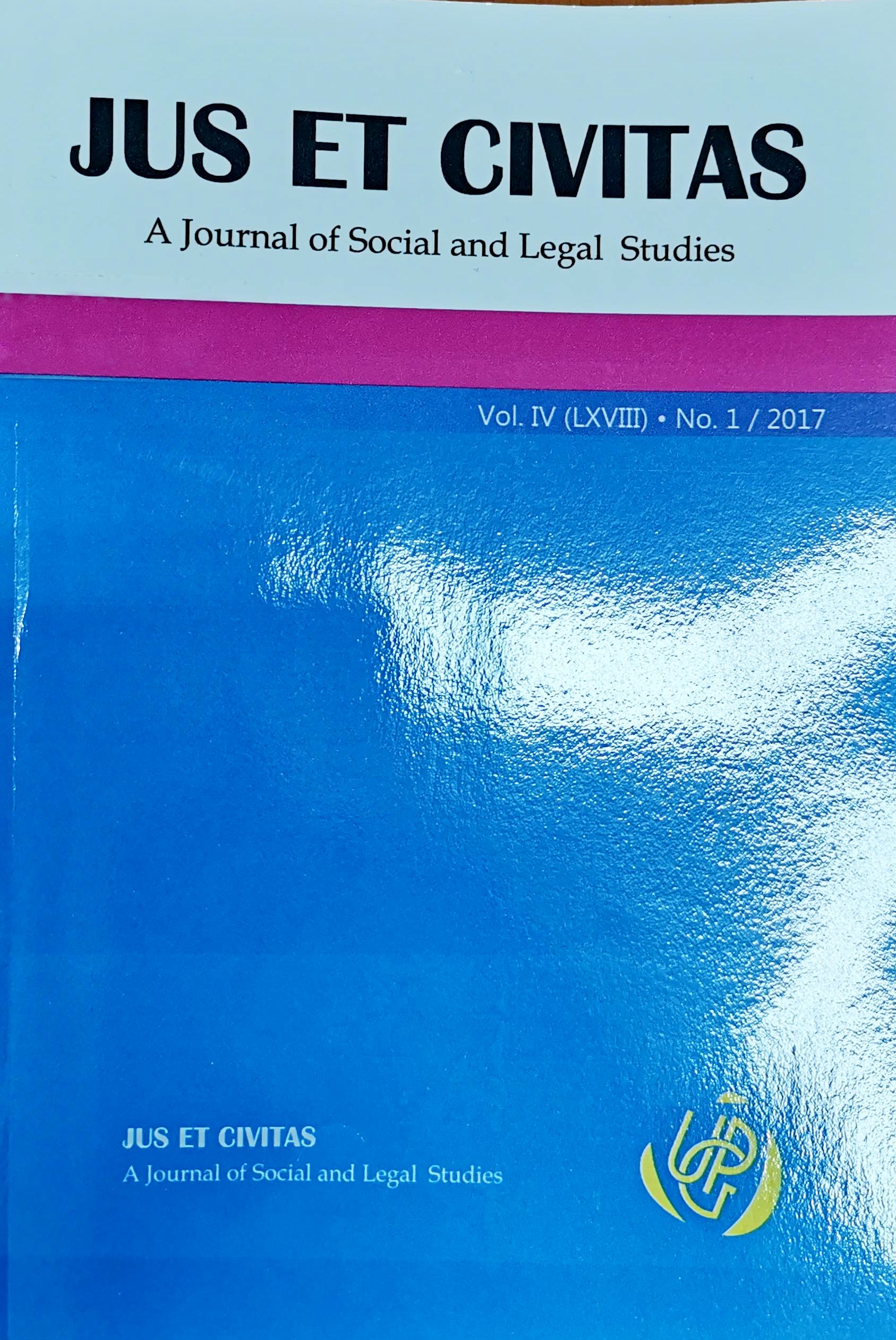
Contemporary society is, unfortunately, characterized by a permanent state of conflict. We are talking about religious, cultural, political, and legal conflicts and the most serious form is the open conflict. This paper aims to define the general concepts, identify and present possible causes and solutions. If at institutional level one can identify a number of authorities that have attributions to solve potential conflicts, at individual level things are much more complex
More...
The discrimination mean the legal impact of the introduction of differences regarding the rights of individuals, aimed at constraining the use of fundamental rights and freedoms of victims of acts of discrimination. But the existence of discrimination is about proving use criteria applicable to such acts, criteria that are found in legislation limiting regulated. Thus, over Community law, the national system is possible assessment of those by the court, in relation to breach of the principle of legal equality of the participants in the legal circuit. Expanding national assessment arrangements made as apparently neutral practices affecting an individual, not based on the criteria expressly provided in can cause discriminatory effects. However, it can only consider as discriminatory practices aimed at restricting, removing the recognition, enjoyment or exercise of fundamental human rights and freedoms. Article detailing the factual indirect discrimination against individualperson, apparently neutral, given the existence of an employment relationship involving subordination, reported at discrimination modalities as incitement to discrimination, multiple facts and victimization. On the other hand, the existence of such acts of discrimination is indicated in the article by presenting a case study.
More...
Labor conflicts have always been a fundamental subject and the methods of solving them have undergone modifications across time. Solving labor conflicts leads, in most cases, to the improvement of the relations between employees and employers at the same time offering solutions to prevent the trigger of these conflicts. This article approaches general aspects regarding the evolution of the regulation of the labor conflicts in Romania as well as the presentation of the present solving procedure
More...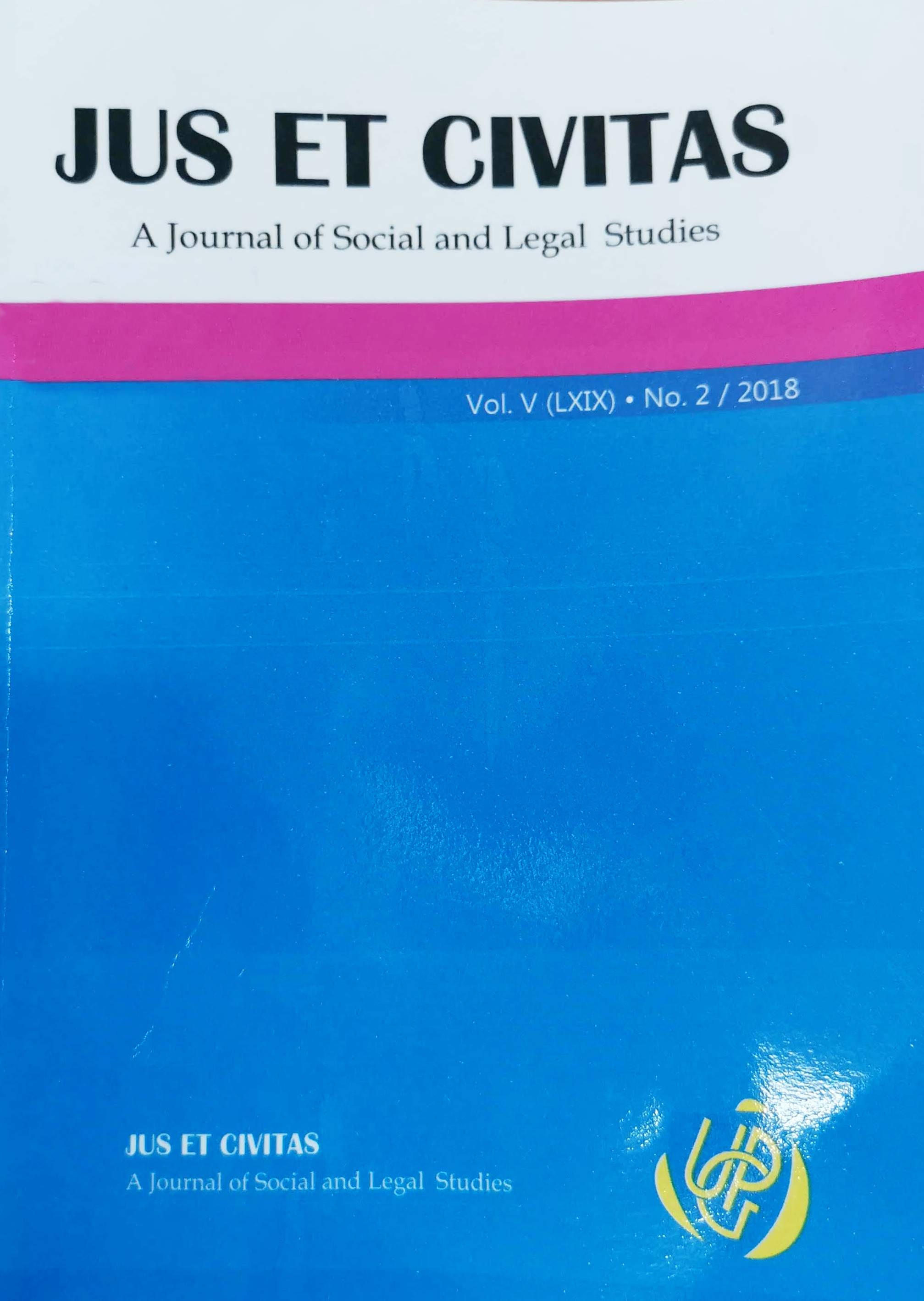
The massive spread of digital technologies has raised new challenges in respect of certain values and rights. In 2016, it was estimated that there were approximately 350 million video surveillance cameras installed worldwide. In this context, it is important to debate and propose concrete measures to address the issues of surveillance, including the challenges for the protection of personal data and human rights generally, while ensuring security.
More...
Since the proclamation of the fundamental rights of every human being through the Universal Declaration of Human Rights, by the pacts, protocols, charts, conventions, declarations that have followed it at international or regional level, often even through their preamble, a "Given" to any of us, regardless of nationality, citizenship, age, gender, color, social or ethnic origin, race, language, religion, opinion, political affiliation, wealth, namely human dignity. Recognizing this quality of any human being, implicitly, in our opinion, it was necessary, at least recognized, if not even protected and even guaranteed, the existence of a private life and, implicitly, a right to it. The content and dimensions of this right have not been established in international documents, and it is preferable that their identification be made through the institutions or courts, where appropriate, responsible for guaranteeing recognition and enforcement of this right. Thus, it was possible to continually and continuously update this content by reference to the social reality in a continuous evolution. So we can now see what is meant by the concept of private life today, but that we can no longer ignore one of its dimensions, which should be acknowledged not only by a legal consecration, but also by an effective application of legal provisions, namely the protection of personal data precisely in order not to affect the private life of a human being, nor, implicitly, its dignity.
More...
This paper highlights the novelty of the appeal in annulment through the new Civil Procedure Code. Structured on three chapters, the paper begins with some general considerations regarding the analyzed institution and continues in chapter two with the examination of the grounds of the appeal in the joint annulment and then of the special one with highlighting the modifications brought in the previous regulation, including those determined by the qualification as final the appeal decision. The third chapter is devoted to a brief analysis of the court procedure, highlighting the novelties raised in this matter.
More...